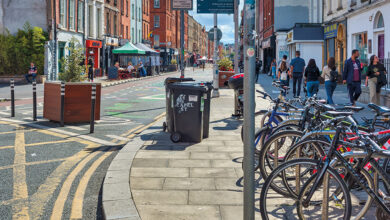Planning ahead for transport
 An updated statement of strategy links the Government’s transport priorities with economic recovery.
An updated statement of strategy links the Government’s transport priorities with economic recovery.
The Department of Transport, Tourism and Sport’s strategy statement for 2015-2017 sets out the “outputs and outcomes” expected from staff over the next two years, with a particular focus on helping the economy to recover, environmental sustainability, and greater safety “for all who use our roads, seas, skies and transport systems.”
Its fiscal priorities (in transport) are to deliver services without budget overruns, comply with the Exchequer’s payroll allocation, and merge the National Roads Authority and the Railway Procurement Agency. The contribution to economic recovery would be judged against Ireland’s success in attracting 7.7 million tourists in 2015 (up from 6.7 million in 2013) and increasing the number of air routes operating into and out of the State.
Three major capital projects are prioritised: the N11 Rathnew/Arklow Road and N7 Newlands Cross schemes (by the end of 2015); Luas Cross City (by 2018); and the N17/N18 Gort to Tuam PPP scheme (for completion in 2018). The Harbours Amendment Bill, to be published later this year, will allow for the transfer of five regional ports – Drogheda, Dún Laoghaire, Galway, New Ross and Wicklow – to local authority control by early 2016, with a new performance management system to be introduced in the following year.
The new tendered bus services are to be in operation by the end of 2016. Fifteen projects are to be completed under the National Cycle Network, Active Travel Towns and Smarter Travel Area programmes, accompanied by 11 greenway programmes. A low carbon sectoral roadmap for transport is to be submitted to the Department of the Environment, Community and Local Government. A new freight policy is also planned, following on from a consultation later this year.
On safety, the department’s main target is to keep road fatalities under 200 per annum. The latest available figures record 190 fatalities in 2013, up from 162 in the previous year. An electronic vessel registration system for ships is also planned and the national vehicle and driver databases will be integrated.
The Chartered Institute of Logistics and Transport (CILT) commented that the statement would effectively cover the next 18 months as a new statement must be published within six months of the formation of the next government. CILT noted that the department’s emphasis is on increasing the value of the State’s shareholding in Aer Lingus. The lack of detail, it said, is unsurprising as the IAG takeover negotiations are ongoing. The institute has stated that it wants to see “a much stronger commitment to dispose of the State’s remaining shareholding in Aer Lingus at an early date.”





